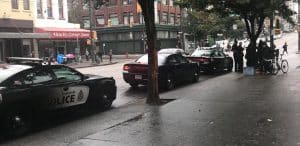During the public dialogue on street checks in Vancouver, the BCCLA has been asked, “What can be done about the practice of street checks?” We believe that the provincial government has an important role to play in regulating policing practices.
 For the most part, police powers in Canada, including police practices, have evolved and expanded through precedents in the common law rather than through legislative changes. The Supreme Court of Canada commented that, “it is to be hoped that legislators in this country will address the issue of police powers in a comprehensive way, as has been done in many other common law jurisdictions.”[1]
For the most part, police powers in Canada, including police practices, have evolved and expanded through precedents in the common law rather than through legislative changes. The Supreme Court of Canada commented that, “it is to be hoped that legislators in this country will address the issue of police powers in a comprehensive way, as has been done in many other common law jurisdictions.”[1]
Prior to the emergence of data on the overrepresentation of Indigenous and Black people in the rates of street checks conducted by the Vancouver Police Department, members of racialized communities in Toronto were speaking out about the practice of “carding” by the Toronto Police Service, which is another name for street check.
Desmond Cole, a Toronto based activist and journalist, wrote an account of being carded more than 50 times by police in Ontario. He summed up his experience this way:
“Because of that unwanted scrutiny, that discriminatory surveillance, I’m a prisoner in my own city.”[2]
As a result of the tireless work of members of racialized communities, the provincial government of Ontario passed a regulation to the Police Services Act, R.S.O. 1990, c. P.15, to limit the practice of carding. The regulation imposes a positive duty on police officers to tell a person being street check that they do not have to provide their personal information to the officer. Although there are some exceptions, in the main it requires that police officers not attempt to collect identifying information from a person unless the officer:
- has informed the person that they are not required to provide identifying information to the officer; and
- has informed the person why the officer is attempting to collect identifying information about the person.
Currently, there is no provincial regulation in British Columbia, but we believe that the provincial government has an important role to play in regulating policing practices. We would support the BC government bringing in a regulation that ensures an end to racial bias in policing and the disproportionate use of policing tactics against marginalized communities.
Notes:
[1] R. v. Clayton, 2007 2 SCR 725, at para. 95.
[2] Desmond Cole, “The Skin I’m In: I’ve been interrogated by police more than 50 times – all because I’m black”, Toronto Life (April 21, 2015), online: https://torontolife.com/city/life/skin-im-ive-interrogated-police-50-times-im-black/.
Should there be a Provincial Policy on Street Checks?
During the public dialogue on street checks in Vancouver, the BCCLA has been asked, “What can be done about the practice of street checks?” We believe that the provincial government has an important role to play in regulating policing practices.
Prior to the emergence of data on the overrepresentation of Indigenous and Black people in the rates of street checks conducted by the Vancouver Police Department, members of racialized communities in Toronto were speaking out about the practice of “carding” by the Toronto Police Service, which is another name for street check.
Desmond Cole, a Toronto based activist and journalist, wrote an account of being carded more than 50 times by police in Ontario. He summed up his experience this way:
As a result of the tireless work of members of racialized communities, the provincial government of Ontario passed a regulation to the Police Services Act, R.S.O. 1990, c. P.15, to limit the practice of carding. The regulation imposes a positive duty on police officers to tell a person being street check that they do not have to provide their personal information to the officer. Although there are some exceptions, in the main it requires that police officers not attempt to collect identifying information from a person unless the officer:
Currently, there is no provincial regulation in British Columbia, but we believe that the provincial government has an important role to play in regulating policing practices. We would support the BC government bringing in a regulation that ensures an end to racial bias in policing and the disproportionate use of policing tactics against marginalized communities.
Notes:
[1] R. v. Clayton, 2007 2 SCR 725, at para. 95.
[2] Desmond Cole, “The Skin I’m In: I’ve been interrogated by police more than 50 times – all because I’m black”, Toronto Life (April 21, 2015), online: https://torontolife.com/city/life/skin-im-ive-interrogated-police-50-times-im-black/.
CIVIL LIBERTIES CAN’T PROTECT THEMSELVES